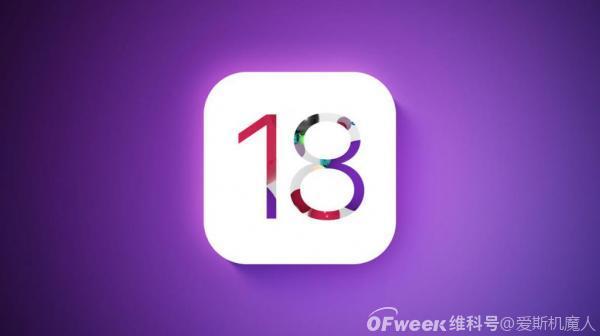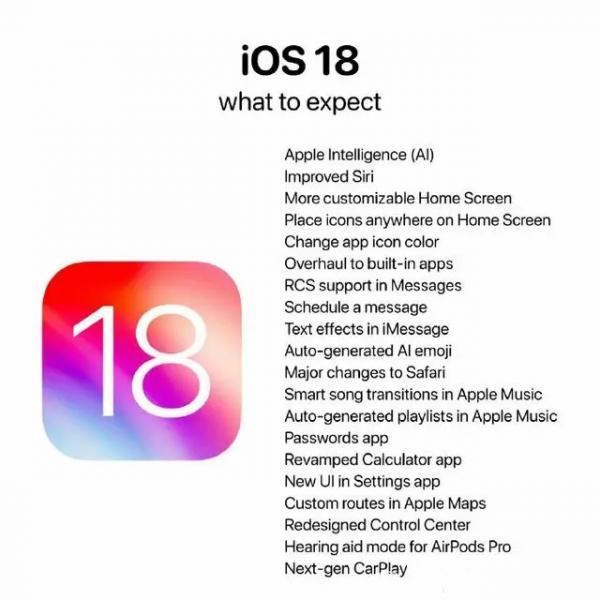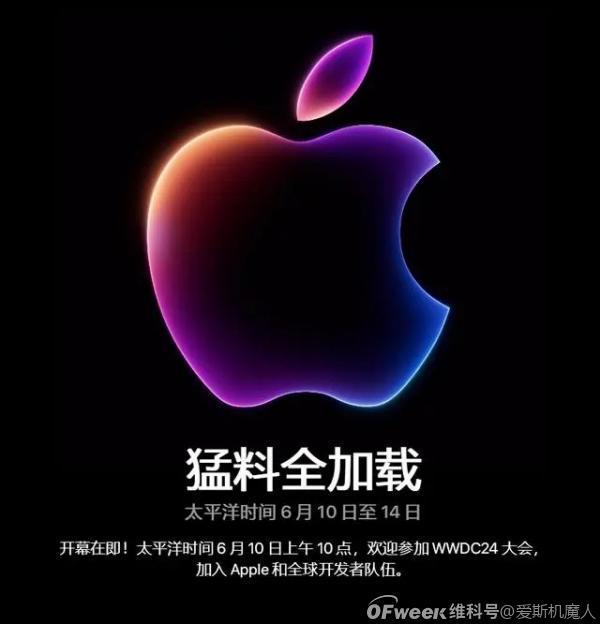iOS 18 Release Imminent: These New Features Are Worth Watching!
![]() 06/11 2024
06/11 2024
![]() 606
606
Article by Mingmei Wuxian
According to official news from Apple, it will hold this year's WWDC event at Apple Park from June 11 to 15, 2024, Beijing time (June 10 to 14, 2024, Pacific Time).
The event will showcase cutting-edge innovations in iOS, iPadOS, macOS, watchOS, tvOS, and visionOS.
Now, as the event approaches, there have been a series of new revelations about the product upgrades Apple will bring.

First, according to foreign media reports, multiple insiders revealed that the upcoming iOS 18 will introduce a brand-new security feature that allows users to lock individual apps.
This feature will support users to lock built-in iPhone apps such as Mail, Messages, Notes, Phone, Photos, Browser, Settings, and more, providing additional safeguards for user privacy and security. To unlock these locked apps, users will need to go through Face ID facial recognition authentication, and it may also support Touch ID or device password unlock.
It is currently unclear whether this feature will apply to third-party apps downloaded from the App Store. Previously, Apple has allowed users to lock certain content through Face ID, Touch ID, or passwords, such as certain notes in the Notes app and photos in the "Recently Deleted" and "Hidden" albums in the Photos app. The new feature in iOS 18 goes a step further, allowing users to lock individual apps even when the phone itself is unlocked.
For iPhone users, in the past, they could lock apps through features like "Screen Time" or "Shortcuts." However, with the arrival of iOS 18, these cumbersome methods will become a thing of the past.
Additionally, according to media reports, iOS 18 introduces a new Dark Mode, which turns the background black and adjusts app icons and folders to Dark Mode.
This feature will initially support Apple's own apps, and Apple will later open relevant API interfaces, enabling third-party apps to adapt and support Dark Mode. By then, app icons in Dark Mode will achieve harmony and uniformity.
Moreover, iOS 18 allows users to customize app icon colors, which is related to this Dark Mode change.
However, it should be noted that "Dark Mode does not protect the eyes." Many people may adjust their phones to Dark Mode before going to bed, but this "Dark Mode" only reduces screen brightness and contrast or reduces the intensity of blue light. Prolonged use can still be harmful to the eyes.
Therefore, to control phone usage time and distance, when scrolling through your phone, you can follow the "20-20-20" rule, which means looking at electronic products for 20 minutes, then looking at a distance of 20 feet (6 meters) for at least 20 seconds. This can effectively prevent eye fatigue and slow down myopia progression.

It is worth mentioning that the leaks also provide detailed information on Siri's integration with no less than 18 built-in iPhone apps. Here are some of the most notable highlights:
Camera: Siri will be able to respond to voice commands for camera control. Users can switch between video and photo modes, activate the shutter timer, and use voice commands to switch between the front and rear cameras.
Mail: For the Mail app, Apple is borrowing a page from Gmail by using machine learning to automatically categorize emails. Additionally, Siri will handle tasks such as composing, sending, and scheduling emails, marking emails as spam, setting reminders, summarizing emails, and creating "Smart Replies".
Photos: Apple may also introduce a set of generative AI-driven photo editing features. The feature set list may be similar to the one offered on Pixel phones, such as the ability to remove unwanted objects from photos and fill in the gaps using generative AI, search for specific photos based on people or animals in them, and apply AI-driven filters.
Safari: Siri integration in Safari can provide web summaries, similar to the functionality provided by Google's Gemini on Android. Additionally, users can expect voice commands for creating new tab groups and opening private tabs.
Voice Memos: Siri will enable hands-free voice memo recording. Users can instruct Siri to create a new recording, start speaking, stop recording, specify a specific name, and even move it to a designated folder - all through voice commands.
In terms of device support, it is currently unknown which phones will support iOS 18. However, for reference, iOS 17 is compatible with every iPhone released after the iPhone XR and iPhone XS. Apple has dropped support for the iPhone 8, iPhone 8 Plus, and iPhone X, all of which were released in 2017.
Therefore, in iOS 18, Apple is likely to drop support for iPhones released in 2018, namely the iPhone XR, iPhone XS, and iPhone XS Max. This means that iPhone 11 or later versions will be required to obtain iOS 18. This speculation is based on Apple's policies in previous years, and if Apple truly upgrades AI in iOS 18, it may have higher requirements on iPhone performance.
Additionally, iPadOS 18 and macOS 15 are expected to share many of the same AI features, and Gurman stated that Macs and iPads require at least an M1 chip to support AI features on the device. In other words, macOS 15 requires a Mac with an Apple M-series chip, and any device before the fifth-generation iPad Pro will not support AI features on iPadOS 18.
While it is not entirely clear what the key hardware requirements for AI on Apple devices are, it is worth noting that unsupported standard iPhone 15 models come with 6GB of RAM, while supported Pro models have 8GB. Similarly, all Apple Silicon-powered iPads and Macs have a minimum configuration of 8GB of RAM. Even when scaled down for narrow use cases, LLMs require a significant amount of working memory due to the vast number of parameters involved, which may be where Apple encounters issues with its device hardware limitations.
Furthermore, Mingmei Wuxian would like to mention that on May 14, according to the China Quality Certification Center website, Apple's headset product, Vision Pro, has passed China's 3C certification, which is a necessary step for the product to be sold in the Chinese market. Therefore, there are speculations that Apple may officially announce the overseas launch plan for Vision Pro at WWDC.
In terms of hardware, foreign media reports indicate that unless it is a "spoiler" for a new device to be released later, Apple does not plan to announce any new hardware products at WWDC 2024 and will instead focus entirely on the upcoming software updates. However, there are also rumors that Apple may bring a new MacBook Air with an M4 chip or introduce an Apple TV set-top box.

Finally, considering the above, iOS 18 will soon be officially released, and the upgrade of the iPhone 16 series in the second half of the year is also highly anticipated. Are you more interested in the new phone release or the iOS update? Let's wait and see what WWDC reveals on the 11th.
So, what else do you expect from Apple AI? Feel free to share your thoughts in the comments section.





